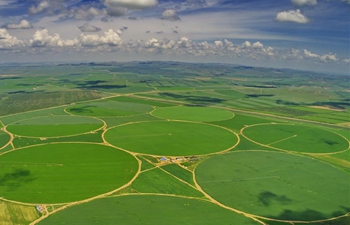CHICAGO, July 25 (Xinhua) -- Add softening agents to keep plumbing free of pipe-clogging mineral buildup may amplify the risk of pathogen release into drinking water, a study of the University of Illinois (UI) shows.
Even with the addition of antimicrobial agents by water companies, the bacteria that grow on the mineral scale can reproduce to harmful levels in supplies that stagnate within indoor plumbing, the study shows.
UI researchers found that the addition of anti-scalant chemicals cause the biofilms to grow thicker and become softer.
They measured the thickness and stiffness of lab-grown biofilms using magnetomotive optical coherence elastography, a tool used to measure the strength of cancer tissues. The analytical method allowed them to quantify the effect that polyphosphate has on the strength of biofilms.
To reproduce what happens in engineered plumbing systems, the researchers used PVC pipe and groundwater from the Champaign-Urbana area source to grow biofilms. They set up multiple scenarios with and without added polyphosphates. All scenarios produced biofilms, but the system that used polyphosphates grew a much thicker and softer biofilms than the others.
"Increased biofilm thickness means more bacteria, and the softening increases the chance that pieces will detach and foul the water supply under normal flow pressure," said Helen Nguyen, a UI professor of civil engineering and co-author of the study.
"Tap water is regulated by the Environmental Protection Agency up to the property line, not the tap. So, in buildings where water has been stagnating for a while, this could become a public health issue," Nguyen said.
The problem is that some sort of anti-scalant chemical is required to maintain adequate water flow through pipes. "Of course, one solution could be to replace pipes once they become clogged with mineral buildup," Nguyen said. "But that would be a very expensive endeavor for public utilities and property owners in a country as large as the United States."
Nguyen believes that the most affordable and realistic solution will come through a better understanding of water chemistry, not by trying to kill all microbes, ripping out pipes or changing regulations.
The study, posted on UI's website Wednesday, has been published in the journal Biofilms and Microbiomes.
















